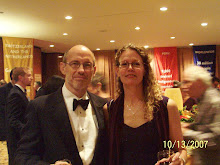Neocons letter to Clinton RE Iraq's WMD 1998
Below is a letter from a band of Neocons to President Clinton dated Jan. 26, 1998. It explains their thinking regarding invading Iraq. It was printed on March 8th, 2001 in the Washington Times Oped pages. The comments within the brackets are mine. Most were written wtih insights already acknowledged in 1998 ... others with insights gained only after Bush's invastion of Iraq. Not much has changed.
******************“Have hawks become doves?”
Dear President Clinton:
We are writing you because we are convinced that current American policy toward
You have an opportunity to chart a clear and determined course for meeting this threat. We urge you to seize that opportunity, and to enunciate a new strategy that would secure the interests of the
The policy of "containment" of Saddam Hussein has been steadily eroding over the past several months. As recent events have demonstrated, we can no longer depend on our partners in the Gulf War coalition to continue to uphold the sanctions or to punish Saddam when he blocks or evades U.N. inspections. Our ability to ensure that Saddam
Hussein is not producing weapons of mass destruction, therefore, has substantially diminished. Even if full inspections were eventually to resume, which now seems highly unlikely, experience has shown that it is difficult if not impossible to monitor
likely that they will be able to uncover all of Saddam's secrets. [True!] As a result, in the not-too-distant future we will be unable to determine with any reasonable level of confidence whether
Such uncertainty will, by itself, have a seriously destabilizing effect on the entire
Given the magnitude of the threat, the current policy, which depends for its success upon the steadfastness of our coalition partners and upon the cooperation of Saddam Hussein, is dangerously inadequate. [Gain cooperation of Hussein? We had his cooperation when he invaded
The only acceptable strategy is one that eliminates the possibility that
In the near term, this means a willingness to undertake military action as diplomacy is clearly failing. [And military action has failed also.] In the long term, it means removing
Saddam Hussein and his regime from power. That now needs to become the aim of American foreign policy. [This could have been done with a real international coalition if we had gone after Saddam for his mass murder of Kurds, Iraqi’s and Iranians with chemical weapons. The
We urge you to articulate this aim, and to turn your administration's attention to implementing a strategy for removing Saddam's regime from power. [
Although we are [NOT] fully aware of the dangers and difficulties in implementing this policy, we believe [Wrongly] the dangers of failing to do so are far greater. We believe [Wrongly] the
necessary steps, including military steps, to protect our vital interests in the Gulf [While ignoring the genocidal interests if the Sudanese Government]. In any case, American policy cannot continue to be crippled by a misguided insistence on unanimity in the U.N. Security Council. [They prefer to have American Policy crippled by its’ military overextension in an unnecessary war.]
We urge you to act decisively. If you act now to end the threat of weapons of mass destruction against the
Signed by,
Elliott Abrams, Richard L. Armitage, William J. Bennett, Jeffrey
Bergner, John Bolton, Paula Dobriansky, Francis Fukuyama, Robert
Kagan,Zalmay Khalilzad, William Kristol, Richard Perle,
Donald Rumsfeld, William Schneider Jr., Vin Weber, Paul Wolfowitz, R.
James Woolsey, Robert B. Zoellick.


0 Comments:
Post a Comment
<< Home